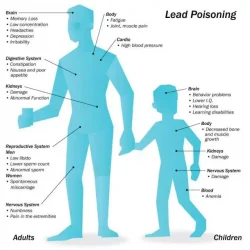 Lead has been used by fishermen, boaters, and hunters for thousands of years. Bullets, jigs/weights, and anchors have utilized Lead since it is heavy and able to be formed into many shapes. This element is naturally found on land, water, and in the air. In large amounts, Lead can be a health concern.
Lead has been used by fishermen, boaters, and hunters for thousands of years. Bullets, jigs/weights, and anchors have utilized Lead since it is heavy and able to be formed into many shapes. This element is naturally found on land, water, and in the air. In large amounts, Lead can be a health concern.
Melting lead allows it to be shaped into weapons, and many useful forms. All of Yellowstone Parks waters have high amounts of lead in them due to geothermal sources. Arsenic and mercury also add to a potentially toxic mix of poisons.
Scientists have been working on this toxic issue for decades. As a result, hunters now are required to use non-lead metals for shot used on waterfowl and in wetland areas. Steel and tungsten shot are common substitutes, with similar properties.
Canadian scientists found that Loons consumed lead shot, which became lodged in their gizzards. Eventually, this lead would kill them. They stated that 40% of the loon population has been killed in this manner.
People that ate paint with lead in it became ill. Water from lead pipes has caused health concerns. Lead is found in gasoline and most fuels. Batteries, paints, solder, and many of our modern plastics and products contain some lead. Smoke from fires and smoking products also releases lead into the environment and our lungs. Removing all lead is unlikely, especially since it is found naturally throughout most ecosystems.
Waterfowl has also been protected because of potential lead poisoning. Yellowstone Park and other areas prohibit the use of lead in jigs, weights, and lures.
Lead poisoning is certainly a concern, but the Science still has many questions to answer. Most of the rules and closures involving lead are based on caution, just in case. Certainly, a shotshell of lead hitting any critter can cause mortal wounds that take time to become fatal.
Fishing sinkers or jigs that end up snagged on the bottom will not rust or decompose. They end up with natural lead deposits. Hooks and other materials will decompose, but not lead.
Metals that are more of a concern are Mercury, from goldmining, and other manmade toxins, PCBs, and harsh dissolved chemicals, not naturally found in watersheds. Many of these end up stored in the fat of one critter, fed on by another, and so forth down the food chain.
Food consumption warnings suggest limits on how much affected fish or other foods can be healthy to consume. These warnings also exist for seafood such as clams, oysters, and other foods.
Throw in the invasive snails, algae, and other cooties and our ecosystems have some major health concerns that need more study.
Scientists need to “get the lead out” so they can make smart and accurate choices for management of our natural resources.
Montana Grant
